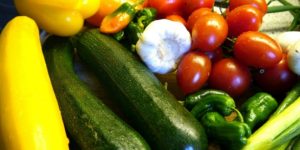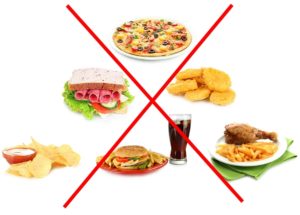How to Waste Less Food
 This is one of the issues with our modern fast-paced society, the question of food waste. And we can start back as early as the 1940s in the United States. During the Second World War, in order to avoid food shortages, the United States government encouraged citizens to stop making wasting food.
This is one of the issues with our modern fast-paced society, the question of food waste. And we can start back as early as the 1940s in the United States. During the Second World War, in order to avoid food shortages, the United States government encouraged citizens to stop making wasting food.And in particular, they encouraged people not to throw away leftover meals, and to give them to their dogs instead. The dog bag was born: the famous doggy bag. With portions on plates often gargantuan, the United States then democratized the practice so that customers could shamelessly bring their leftovers home.
This bag has been widely anchored in Anglo-Saxon and Asian culture ever since. But not yet in France, where the fear of passing for a big stingy remains very present. But from 2021, everything will change in France since restaurateurs will have the obligation to provide doggy bags to the customers who request it.
So it is certainly not with the dog bag that we are going to solve the problem of food waste, but mentalities are changing in a context where waste is less and less tolerated. If we want to reduce the cost of food waste disposal and the effect on the environment, then we should all make an effort to reduce food waste.
What do food losses represent in our country?
Each year in France, nearly 10 million tonnes of edible food go into the trash bin. And if we take into account the whole chain, from production to consumption, it’s the equivalent of 150 kilos of food per year and per capita that ends up being sent directly to the dumpster. For the consumption phase alone, each of us throws away 30 kilos of food, including 7 kilos of unconsumed and still packaged food waste.
Food waste is unbearable because it represents a huge waste of natural resources such as arable land and water. But it is also greenhouse gas emissions that are emitted for no reason. According to the Environment and Energy Management Agency (ADEME), this represents 3% of all national emissions worldwide due to the energy required to produce, transform, conserve, pack and transport food. Such food waste is also estimated to generate losses between 12 and 20 billion euros per year in France only, and finally it is a social and ethical issue at a time when 1 in 10 people in that country are in a situation of food insecurity .
How can we fight this scourge?
First of all, by modifying our habits at home so that they are more respectful regarding our food. Individual losses represent 33% of the entire food chain. But that’s not enough. This is the reason why France, which wants to cut waste by half by 2025, recently adopted a law which strengthens the provisions and which plans more restrictive measures by extending the law to catering and industry after distribution.
It is mostly a problem of public awareness. It is also a problem of finding better ways to reduce food waste along the food distribution channels. Improving logistics, introducing more flexibility regarding which crops are planted, favoring better preservation methods and emphasizing more local production venues, these are some pointers that could help reduce our food waste.
Creating a Life of Wellness Starts Today
 I’ve never been thin or obese, yet I’ve never been comfortable with the way I look no matter how much I’ve weighed. I’m not looking to be on the cover of MORE Magazine. I don’t need to look like Christie Brinkley. I’m enjoying who I am right now at this point in my life.
I’ve never been thin or obese, yet I’ve never been comfortable with the way I look no matter how much I’ve weighed. I’m not looking to be on the cover of MORE Magazine. I don’t need to look like Christie Brinkley. I’m enjoying who I am right now at this point in my life.But I want to be comfortable with how I look and feel.
I’ve always had a hate-hate relationship with dieting. I love all kinds of food, so dieting has always meant the need to cut back on the love.
“The biggest seller is cookbooks and the second is diet books—how not to eat what you’ve just learned how to cook.” ~Andy Rooney
I’m not looking for a diet. I’m looking for a new way of life.
My family’s genetics scares the hell out of me. That fear is the driving force behind waging an all-out war against gaining weight. It’s an uphill battle, but I’m determined to win the war.
Today I’m a 55-year-old menopausal woman with an autoimmune disease, and these three factors make losing weight more difficult.
A few months ago I watched a documentary called “Fat, Sick and Nearly Dead” that chronicled the life of Joe Cross, a 310-pound man on a mission to get healthy. It follows his journey across America, with his juicer and camera in tow, drinking only fruits and vegetables for 60 days. His hope was to lose weight while allowing his body to heal itself from a diagnosed autoimmune disease.
After watching the documentary I ordered the same Breville juicer Joe used. I then took a hard look at myself by asking, “Do I want to continue sailing through life not liking the way I look and feel?”
I decided to face my fear head-on by broaching my taboo subject of discussing my weight during dinner. Out of nowhere, I proclaimed, “I want to get healthier and lose weight.”
My husband quietly asked, “How can I help you?”
We spent time talking about healthy eating and exercises I might enjoy. We already try to follow a healthy diet at home (much like what is outlined in Dr. Andrew Weil’s book, “Eating Well for Optimal Health”), yet I need to create my own eating plan (a/k/a portion control) according to my personal goals.
I reached out to an online friend who possesses a wealth of knowledge on healthy living. She was so inspirational that I’d like to share her wisdom with you:
“Find things you really love to do and just do them. Don’t feel you have to do “such and such” to be fit. If you love to take walks, take walks, but don’t get stuck thinking just because you can’t do other things, it’s useless. I think the main thing is to feel good about whatever you can do. Then there’s food. That is something you can control. So eat healthily. Consider yourself like an expensive car that only takes the best gas. Remember to tell yourself how great you are. You can do anything. You have to say it, read it and actually see the words, “I can do this. I can do this.”
Powerful words.
These days I’m facing my personal weight demons by trying to take better care of myself. I plan on living a long and happy life, and to do that I need to tend to my health.
One more piece of advice from Dr. Christian Northrup in her book, “Women’s Bodies, Women’s Wisdom”:
“Nourishing yourself fully also involves understanding that your body’s metabolic processes are profoundly influenced by the following eight factors:
- Emotional state
- Genetic heritage
- Cultural and family heritage
- Macronutrient intake (proteins, fats, carbohydrates)
- Micronutrient intake (vitamins and minerals)
- Environment and relationships
- Exercise habits
- Food chi
Nourishing yourself optimally means paying attention to each of these areas.”
Today really IS the first day of the rest of my life. How about you?
Intention: The Four Important Words For Wellness
 It has become popular this year to choose one word that defines the intent you set for yourself for the New Year. For example, one person could choose the word “serenity” as their guide, using it as their daily mantra. Another could choose the word “success” or perhaps the word” worthy.” All are good choices, helping to define the personal goals you want to set for yourself.
It has become popular this year to choose one word that defines the intent you set for yourself for the New Year. For example, one person could choose the word “serenity” as their guide, using it as their daily mantra. Another could choose the word “success” or perhaps the word” worthy.” All are good choices, helping to define the personal goals you want to set for yourself.I’ve thought about this idea for the purpose of my “Wellness” category here on Boomeon. Starting with a clean slate we begin anew to reach further than we have before in our ongoing quest for personal growth. We use our past successes and failures as the catalyst to do better, dream deeper and explore farther.
But wellness is difficult to define in one word. There are many paths to follow for us to reach our chosen destination. For this reason, I think it’s necessary to choose several words to set our intentions for the coming year. Here are a few that stand out among them:
Gratitude
The world we live in is fast-paced. Keeping up with the treadmill of life can leave us feeling weary, anxious and empty. In our rush to get things done, we sometimes forget to take a moment to look around and notice our blessings. Keeping a gratitude journal or making a mental note of our blessings is important for our spiritual and physical health.
Peace
Peace means different things to different people. With global unrest, it can mean a wish to end all violence. But in the realm of wellness peace can mean the joy we feel when we reach inner peace. How can we achieve this? Here are a few things we can do:
- Remove toxic relationships.
- Surround yourself with those who love and care about you.
- Find what you’re passionate about and make that a part of your life.
- Listen to your instincts by saying “yes” and “no” to create the kind of balance you desire in your life.
- Slow down and enjoy your life. Be mindful as often as possible, and breathe in the fragrance of happiness.
Health
Taking care of your physical, emotional and spiritual needs are vital to aging gracefully. Eating healthy foods, getting regular exercise and finding time to meditate (or doing whatever you find is calming for you) will collectively turn you into a healthier and happier person.
Remember to schedule regular doctor appointments. Also, spend time doing research from reputable websites for information about alternative ways to care for your health issues.
Reach
Reach for the stars. Reach for meaningful relationships. Reach for that “something” you’ve always wanted to do and just do it. Reach out to others for help, guidance, and solace. Reach out to those in need (including animals) and do what you can to help them. Reach out to people you’ve lost touch with. Reach, stretch and bend, even if it’s out of your comfort zone, to reach toward the life you’ve always wanted. Reach. It’s such a magical word.
Good Food That You Should Avoid
 If there is one thing you need to look out for when trying to lose weight and live a healthy and natural life, that is the food you eat. A lot of the items in our diet can, in fact, do more harm than good.
If there is one thing you need to look out for when trying to lose weight and live a healthy and natural life, that is the food you eat. A lot of the items in our diet can, in fact, do more harm than good.Yes, food can be satisfying, delicious, and on the go, but most, if not all of them, can contribute to more weight and unhealthy lifestyle. Here are is a list of yummy, delicious, good food, that shouldn’t be in your diet.
Bread
Yes, one common characteristic of bread is they are packed in calories. But many of them are still good for you (in moderation, of course!). The kind of bread you should say no to is the white bread. It is highly refined and contains a lot of sugars.
Eating white bread can immediately put your blood sugar levels to the roof! Because of this, it can get you to eat more instead of less. It is on the high glycemic index and shouts be avoided.
Chocolates and Candy Bars
Most average sized candy bars contain about 250 to 350 calories. If it’s covered in chocolate, it will contain more. They are extremely bad for you as they contain added oils, refined flour and a lot of sugar – little to no nutrients at all. The unfortunate thing about it is that candy bars are easily accessible and can be found everywhere, so it’s quite easy to get tempted. A good alternative to satisfy your sweet tooth is eating a piece of fruit.
Fruit Juices
As long as they are contained and sold in the box, this is not the fruit juice you should be drinking. The fruit juices you buy in bottles and cartons aren’t exactly similar to the fruit it claims to come from. Fruit juices are highly concentrated with sugar and may contain additives to prolong its shelf life.
Fruit juices like these contain no fiber at all too. That really beats the purpose of including fruits in your diet. If you want to drink some orange juice, eat the fruit instead. You’ll feel even fuller compared to drinking a whole glass of it.
Soda and Other Carbonated Drinks
Beverages such as these mostly contain sugar, water, and carbon dioxide for the bubbles. It is one of the unhealthiest foods in the world. Do you know drinking a glass of soda is equivalent to eating 7 tablespoons of sugar? If you are serious on your weight loss, you need to get rid of this, for good.
Potato Chips and French Fries
Potatoes are filling and can be healthy, but if it is soaked and cooked in oil, it loses all its value. Just imagine, one stick of French fries will give you 75 calories. Eating a small bowl will satisfy your daily calorie requirement for the entire day.
Alcohol
No, just because alcohol makes you feel warm does not mean it burns fat. Alcohol, actually, provides more carbohydrates compared to your regular meal. As many nutritionists say, drinking alcohol, like beer, is like drinking liquid white bread.
There are so many evidence that drinking is related to weight gain and obesity. But recent studies show that in moderation, it may help with weight loss. One thing is for sure, it’s better to be safe and throw away the booze than try to experiment on this one. If you’re serious about losing weight, skip the alcohol.
Pizza
Average Americans prefer to eat pizza when they’re feeling tired to prepare a proper meal. Do you know that pizza is considered a fast food and maybe the dumping site of all processed food?
Most pizzas use white bread as their crust. Aside from that, the meats, cheeses, and other toppings aren’t so calorie-conscious too? The best way to enjoy pizza is to make one at home, where you can control your ingredients and portions.